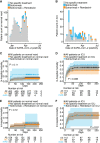Sotrovimab in Hospitalized Patients with SARS-CoV-2 Omicron Variant Infection: a Propensity Score-Matched Retrospective Cohort Study
- PMID: 36475890
- PMCID: PMC9927465
- DOI: 10.1128/spectrum.04103-22
Sotrovimab in Hospitalized Patients with SARS-CoV-2 Omicron Variant Infection: a Propensity Score-Matched Retrospective Cohort Study
Abstract
In vitro data suggest the monoclonal antibody sotrovimab may have lost inhibitory capability against the severe acute respiratory syndrome coronavirus 2 (SARS-CoV-2) Omicron variant. We aimed to provide real-life data on clinical outcomes in hospitalized patients. We retrospectively analyzed patients who were treated at the University Medical Center Hamburg-Eppendorf, Germany, between December 2021 and June 2022. Out of all 1,254 patients, 185 were treated with sotrovimab: 147 patients received sotrovimab monotherapy, and 38 received combination treatment with sotrovimab and remdesivir. We compared in-hospital mortality for the different treatment regimens for patients treated on regular wards and the intensive care unit separately and performed propensity score matching by age, sex, comorbidities, immunosuppression, and additional dexamethasone treatment to select patients who did not receive antiviral treatment for comparison. No difference in in-hospital mortality was observed between any of the treatment groups and the respective control groups. These findings underline that sotrovimab adds no clinical benefit for hospitalized patients with SARS-CoV-2 Omicron variant infections. IMPORTANCE This study shows that among hospitalized patients with SARS-CoV-2 Omicron variant infection at risk of disease progression, treatment with sotrovimab alone or in combination with remdesivir did not decrease in-hospital mortality. These real-world clinical findings in combination with previous in vitro data about lacking neutralizing activity of sotrovimab against SARS-CoV-2 Omicron variant do not support sotrovimab as a treatment option in these patients.
Keywords: COVID-19; Omicron; Omicron variant; SARS-CoV-2; monoclonal antibodies; remdesivir; sotrovimab.
Conflict of interest statement
The authors declare no conflict of interest.
Figures

Similar articles
-
Clinical Efficacy of the Neutralizing Antibody Therapy Sotrovimab in Patients with SARS-CoV-2 Omicron BA.1 and BA.2 Subvariant Infections.Viruses. 2023 May 31;15(6):1300. doi: 10.3390/v15061300. Viruses. 2023. PMID: 37376600 Free PMC article.
-
Change in effectiveness of sotrovimab for preventing hospitalization and mortality for at-risk COVID-19 outpatients during an Omicron BA.1 and BA.1.1-predominant phase.Int J Infect Dis. 2023 Mar;128:310-317. doi: 10.1016/j.ijid.2022.10.002. Epub 2022 Oct 10. Int J Infect Dis. 2023. PMID: 36229005 Free PMC article.
-
Clinical efficacy and in vitro neutralization capacity of monoclonal antibodies for severe acute respiratory syndrome coronavirus 2 delta and omicron variants.J Med Virol. 2022 Oct;94(10):5038-5043. doi: 10.1002/jmv.27916. Epub 2022 Jun 11. J Med Virol. 2022. PMID: 35662058 Free PMC article.
-
Real-world effectiveness of sotrovimab for the treatment of SARS-CoV-2 infection during Omicron BA.2 subvariant predominance: a systematic literature review.Infection. 2024 Feb;52(1):1-17. doi: 10.1007/s15010-023-02098-5. Epub 2023 Sep 30. Infection. 2024. PMID: 37776474 Free PMC article. Review.
-
[Sotrovimab in controlling SARS-CoV-2 infection].Pol Merkur Lekarski. 2022 Feb 22;50(295):48-50. Pol Merkur Lekarski. 2022. PMID: 35278299 Review. Polish.
Cited by
-
What Is the Efficacy of Sotrovimab in Reducing Disease Progression and Death in People with COVID-19 during the Omicron Era? Answers from a Real-Life Study.Viruses. 2023 Aug 17;15(8):1757. doi: 10.3390/v15081757. Viruses. 2023. PMID: 37632099 Free PMC article.
-
Allogeneic hematopoietic stem cell transplantation in the COVID-19 era.Front Immunol. 2023 Feb 22;14:1100468. doi: 10.3389/fimmu.2023.1100468. eCollection 2023. Front Immunol. 2023. PMID: 36911678 Free PMC article. Review.
References
-
- WHO. 2022. WHO coronavirus (COVID-19) dashboard. https://covid19.who.int.
-
- Dejnirattisai W, Huo J, Zhou D, Zahradník J, Supasa P, Liu C, Duyvesteyn HME, Ginn HM, Mentzer AJ, Tuekprakhon A, Nutalai R, Wang B, Dijokaite A, Khan S, Avinoam O, Bahar M, Skelly D, Adele S, Johnson SA, Amini A, Ritter TG, Mason C, Dold C, Pan D, Assadi S, Bellass A, Omo-Dare N, Koeckerling D, Flaxman A, Jenkin D, Aley PK, Voysey M, Costa Clemens SA, Naveca FG, Nascimento V, Nascimento F, Fernandes da Costa C, Resende PC, Pauvolid-Correa A, Siqueira MM, Baillie V, Serafin N, Kwatra G, Da Silva K, Madhi SA, Nunes MC, Malik T, Openshaw PJM, Baillie JK, Semple MG, ISARIC4C Consortium , et al. 2022. SARS-CoV-2 Omicron-B.1.1.529 leads to widespread escape from neutralizing antibody responses. Cell 185:467–484.e15. doi:10.1016/j.cell.2021.12.046. - DOI - PMC - PubMed
-
- Cao Y, Wang J, Jian F, Xiao T, Song W, Yisimayi A, Huang W, Li Q, Wang P, An R, Wang J, Wang Y, Niu X, Yang S, Liang H, Sun H, Li T, Yu Y, Cui Q, Liu S, Yang X, Du S, Zhang Z, Hao X, Shao F, Jin R, Wang X, Xiao J, Wang Y, Xie XS. 2022. Omicron escapes the majority of existing SARS-CoV-2 neutralizing antibodies. Nature 602:657–663. doi:10.1038/s41586-021-04385-3. - DOI - PMC - PubMed
-
- Brehm TT, Pfefferle S, von Possel R, Karolyi M, Zoufaly A, Wichmann D, Kobbe R, Emmerich P, Nörz D, Aepfelbacher M, Schulze Zur Wiesch J, Addo MM, Schmiedel S, Lütgehetmann M. 2022. Clinical efficacy and in vitro neutralization capacity of monoclonal antibodies for severe acute respiratory syndrome coronavirus 2 delta and omicron variants. J Med Virol 94:5038–5043. doi:10.1002/jmv.27916. - DOI - PMC - PubMed
-
- Takashita E, Yamayoshi S, Simon V, van Bakel H, Sordillo EM, Pekosz A, Fukushi S, Suzuki T, Maeda K, Halfmann P, Sakai-Tagawa Y, Ito M, Watanabe S, Imai M, Hasegawa H, Kawaoka Y. 2022. Efficacy of antibodies and antiviral drugs against Omicron BA.2.12.1, BA.4, and BA.5 subvariants. N Engl J Med 387:468–470. doi:10.1056/NEJMc2207519. - DOI - PMC - PubMed
MeSH terms
Substances
Supplementary concepts
LinkOut - more resources
Full Text Sources
Medical
Miscellaneous

